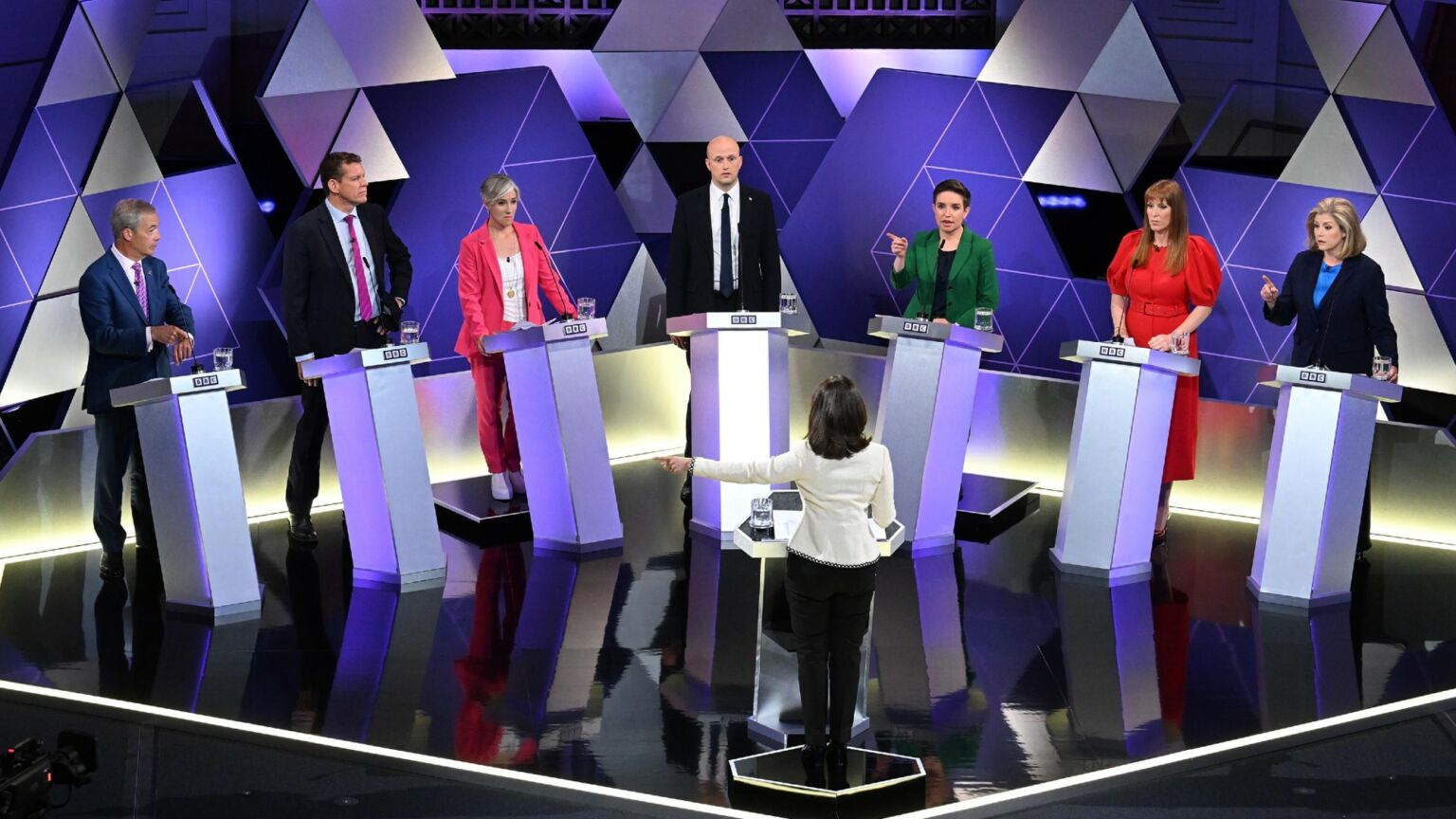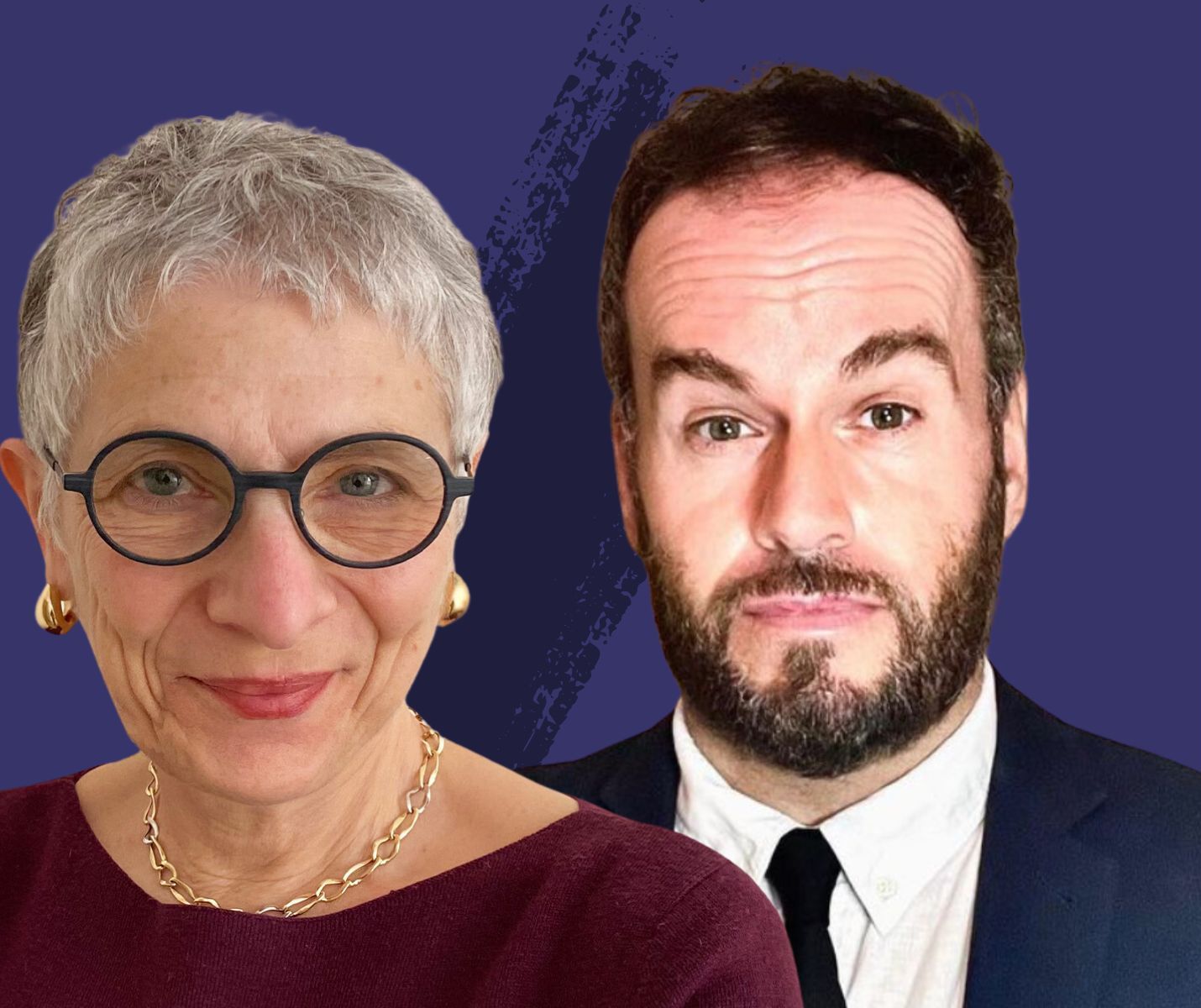We need a revolt against the uniparty
The BBC election debate exposed the dire state of mainstream party politics.

Want to read spiked ad-free? Become a spiked supporter.
After ITV’s dismal Rishi Sunak vs Keir Starmer stand-off on Tuesday, it was the BBC’s turn on Friday evening to punish viewers with an election debate. Featuring the leading figures from the seven biggest parties, including the lone disruptor, Nigel Farage, it certainly promised to be a bit more interesting. It began with Tory sword-carrier Penny Mordaunt criticising her own party leader Rishi Sunak, for his decision to leave the international D-Day commemoration event early. But it soon degenerated into a fractious, unedifying and predictable affair.
Much of the blame for this lies with the technocrats of Labour and the Tories. With barely a cigarette paper between the two on anything that matters, their higher-ups seem to have mistaken angry, pointy slanging matches for actual political disagreement. We saw this play out on Tuesday, when Sunak and Starmer exchanged unpleasantries. Last night’s debate followed a similar pattern, with Mordaunt bickering with Labour’s deputy leader Angela Rayner. The only difference was that this time they squabbled while representatives from the Greens, the SNP, the Lib Dems, Plaid Cymru and Reform sniped from the margins.
All the attack lines from the Tory-Labour axis of tedium were virtually the same as deployed on Tuesday. Mordaunt was able to squeeze in a dig about Labour’s alleged plans to raise taxes in her non-answers to almost every question. Meanwhile, Rayner managed to blame everything, from the decimation of the UK’s armed forces to the state of the NHS, on Liz Truss’s ‘disastrous’ mini-budget and ’14 years of Tory chaos’. Their refusal to stray from this over-rehearsed messaging made for a constant stream of irritable exchanges and predictable soundbites. ‘Well that was dignified, wasn’t it?’, said Green co-leader Carla Denyer to applause, after Mordaunt and Rayner engaged in a prolonged school-yard spat over tax. It was perhaps the only insightful thing Denyer has ever said.
The inclusion of Reform leader Farage did liven up proceedings. He was the only politician at the debate willing to consistently challenge the underlying consensus on show. He may not have the answers to the various problems that face us, but at least he is willing to concede those problems exist. Not so for the other leaders, who sang from the same hymn sheet on every single issue.
To a question on the future of the NHS, the six others insisted there was nothing wrong with ‘our NHS’ that more funding couldn’t fix. Farage was the only one to point out that the more that is spent on it, the worse it seems to get. The NHS model is wrong, he said, before calling for a French-style insurance system. Cue outrage from the others at Farage’s act of sacrilege. He wants to ‘privatise’ our ‘national treasure’, cried the SNP’s Stephen Flynn.
The same went for a question on whether tackling climate change is compatible with the pursuit of economic growth. All the others agreed that a great green economic boom is just around the corner. The Greens and the Lib Dems even seemed convinced that a national wall-cavity-insulation scheme is the key to our future prosperity. Who knew? Farage alone blasted Net Zero, arguing – rightly – that we are ‘sacrificing’ our industry and living standards for no real gain. ‘The fact-checkers will be busy tonight’, was the smug retort from Denyer.
Thus, Farage was treated like the uninvited guest at a north London dinner party, ruining the ambience with his heretical views. Plaid Cymru’s Rhun ap Iorwerth accused him of ‘bigotry’. Denyer said he was ‘cold’ and lacking in humanity for questioning mass immigration, even though huge numbers of Brits share these concerns.
The final televised moments after the debate had finished said more than the previous 90 minutes’ worth. The six other leaders could be seen shaking hands and congratulating one another. Even Mordaunt and Rayner were caught smiling and chatting away like old friends, despite their earlier tetchiness. None turned to Farage. Another telling illustration of the uniparty in action.
Tim Black is a spiked columnist.

Melanie Phillips and Brendan O’Neill – live and in conversation
Wednesday 26 June – 8pm to 9pm BST
This is a free event, exclusively for spiked supporters.
Picture by: Getty.
Who funds spiked? You do
We are funded by you. And in this era of cancel culture and advertiser boycotts, we rely on your donations more than ever. Seventy per cent of our revenue comes from our readers’ donations – the vast majority giving just £5 per month. If you make a regular donation – of £5 a month or £50 a year – you can become a and enjoy:
–Ad-free reading
–Exclusive events
–Access to our comments section
It’s the best way to keep spiked going – and growing. Thank you!









Comments
Want to join the conversation?
Only spiked supporters and patrons, who donate regularly to us, can comment on our articles.